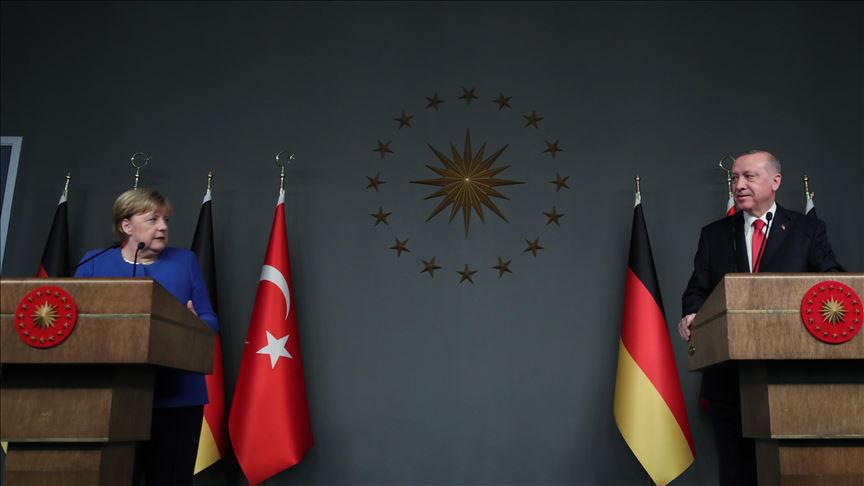 President of Turkey, Recep Tayyip Erdogan (R) and German Chancellor Angela Merkel (L) hold a joint press conference following their inter-delegation meeting at Vahdettin Mansion in Istanbul, Turkey on January 24, 2020.
( Murat Kula - Anadolu Agency )
President of Turkey, Recep Tayyip Erdogan (R) and German Chancellor Angela Merkel (L) hold a joint press conference following their inter-delegation meeting at Vahdettin Mansion in Istanbul, Turkey on January 24, 2020.
( Murat Kula - Anadolu Agency )
ANKARA
Turkey will not leave Libyan Prime Minister Fayez al-Sarraj alone, and it is “determined to provide as much support as it can,” the Turkish president said Friday.

Speaking in a joint press conference with German Chancellor Angela Merkel in Istanbul, Recep Tayyip Erdogan said: “We are determined not to leave Libyan brothers alone during these difficult days."
"Supporting Libya's Government of National Accord [GNA] is not an option, but an obligation pursuant to the UN Resolution 2259.
"Turkey and Germany are giving priority to the solution of problems through dialogue, urging the sides for common sense and sanity,” he added.
Merkel said: “Fragile cease-fire in Libya must be turned into a permanent one.
“Articles agreed at Berlin summit on Libya will be approved by the UN Security Council,” she added.
Stressing that the sides in Libya agreed on a 55-article peace plan, Merkel said: “Haftar only accepted the cease-fire and offered a name for the military committee. The first goal was to convene the supporters of one of the sides so far.”
On Jan. 12, parties in Libya announced a cease-fire in response to a joint call by the leaders of Turkey and Russia. But talks for a permanent cease-fire ended without an agreement after renegade commander Khalifa Haftar left Moscow without signing the deal.
On Sunday, Haftar accepted terms in Berlin to designate members to a UN-proposed military commission with five members from each side to monitor the implementation of the cease-fire.
Since the ouster of late ruler Muammar Gaddafi in 2011, two seats of power have emerged in Libya: one in eastern Libya supported mainly by Egypt and the United Arab Emirates, and the other in Tripoli, which enjoys the UN and international recognition.
Haftar’s military offensive against the GNA has claimed the lives of more than 1,000 people since April last year.
Syrians fleeing Idlib towards Turkey
The Turkish president said it is a "humanitarian responsibility" of the EU and European countries to provide more and immediate assistance to Syrians.
Erdogan emphasized that Syria's Idlib, where 4 million people live, has been exposed to the heavy attacks by the Bashar al-Assad regime in recent weeks.
"The regime is constantly bombing all civilian settlements, including schools and hospitals. We are doing our best to alleviate the human drama that the people of Idlib are in," he said.
Erdogan also said he discussed with Merkel helping people who fled from Idlib move from tents into small houses during the winter season.
"Everyone needs to put pressure on the regime for ending the ferocity of our brothers and sisters in Idlib," he added.
Merkel, on her turn, said her country is ready to provide financial aid to improve the humanitarian situation of Syrians fleeing the conflict-hit province of Idlib.
She also said Germany could support the construction of shelters for civilians fleeing towards Turkey from Idlib.
Since the eruption of the bloody civil war in Syria in 2011, Turkey has taken in over 3.6 million Syrians who fled their country, making Turkey the world’s top refugee-hosting country. Ankara has so far spent $40 billion for the refugees, according to official figures.
Merkel added that she thinks the EU will provide additional support for the Syrian refugees apart from the pledged €3+€3 billion.
Under the 2016 deal, the EU had pledged €6 billion ($6.6 billion) aid to improve living conditions of Syrian refugees in Turkey. But only €2.22 billion ($2.43 billion) were disbursed by June 2019.
Turkey and Russia agreed in September 2018 to turn Idlib, Syria into a de-escalation zone in which acts of aggression are expressly prohibited.
Since then, more than 1,300 civilians there have been killed in attacks by the Bashar al-Assad regime and Russian forces as the cease-fire continued to be violated.
More than 1 million Syrians have moved near the Turkish border due to intense attacks over the last year.
Turkish-German relationship
Erdogan said Turkey is determined to boost cooperation with Germany in fields of economy, trade, investment, energy, and tourism.

President of Turkey Erdogan (4th R) and German Chancellor Angela Merkel (4th L) attend a dinner in Istanbul, Turkey on January 24, 2020.
“Turkey and Germany agree that the two countries' continuing deep-rooted friendly relations are also for the benefit of the region,” he added.

Referring to Turkey’s accession to the EU under Germany's EU presidency term, which is set to begin in July, Merkel said they will make their best to "make progress" on the issue.
"We will also do our best for the continuation of financial supports, because these aids are used directly for the benefit of refugees," she added.








